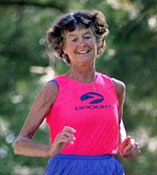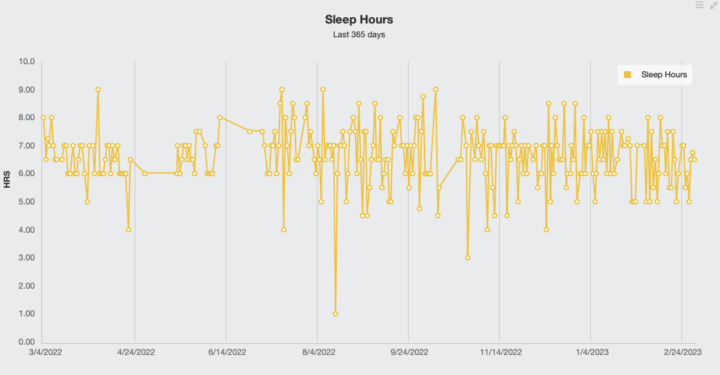Featured Senior Athlete: The Iron Nun
Sister Madonna Buder (picture below), often referred to as the “Iron Nun,” is the oldest woman to ever finish an Ironman© triathlon (the oldest man is Hiromu Inada at age 85 in 2018 in Kona, Hawaii in 16:53:49). In 2014, at age 82, Sister Madonna crossed the finish line at Ironman Canada in 16:32:00, well under the 17-hour cutoff, some 27 years after her first Ironman at age 55. Much of her bike training at that time consisted of riding to church or to a lake for a swim. Running often included a jog to the local penitentiary where she visited inmates and read scripture with them. Not your normal Ironman triathlon training routine. But it worked.

Despite such largely unstructured training, Sister Madonna has won her age group 12 times at the Ironman World Championship in Kona. Her personal best time for the distance is 13:16:34 which came at age 62, also at Ironman Canada.
What keeps her going, despite occasional DNFs, multiple broken bones from bike crashes over the years, and a busy schedule of volunteer work in Spokane, Washington where she lives? Fortitude. “The only failure,” she says, “is not to try.”
Sister Madonna is well known and highly regarded throughout the triathlon community as a reluctant celebrity and role model for all ages. In 2014 she was inducted into the USA Triathlon Hall of Fame.
Part 7. Sleep and the Senior Athlete
Are you getting adequate sleep? Most coaches agree that this is at or near the top of the most important things you must do as a senior athlete, and as an athlete of any age. But the cards seem to be stacked against you as a senior when it’s bedtime. It’s common for 60- and 70-plus athletes to have a hard time falling asleep. And to make matters worse, you often wake up in the middle of the night often without apparent reason. You also may get up several times to pee and find it hard to fall asleep again each time. By morning you’ve only gotten a few hours of sleep. You’re wasted. You’re not alone. Most of us at in that age group have the same problem.1,2 I certainly do.
Below is a graph of my nightly sleep hours for most of the last 365 days. It’s only been in the last three months or so that I’ve figured out a way to have fewer sleepless nights. Notice that in December, January, and February there are fewer deep “valleys” of short sleep hours. I’ll get to what I’ve been doing to help my sleep in a bit.

Why is sleep so important? Are there serious downsides to inadequate sleep? Yep.
Reduced sleep is very likely to leave you feeling tired throughout the following day. And, of course, that makes you question your readiness for a workout. This is a common morning conundrum for many aging athletes: should I train as planned, reduce the workout training load, or not workout at all? As a senior athlete such questions are common after a night of tossing and turning in bed. Of course, the answer comes down to the details of your physiology (for example, heart rate and heart rate variability) and, just as important, how you are feeling that morning. (Sidenote: You can get assistance with such matters by regularly using the app HRV4Training.)
Besides feeling tired right out of bed in the morning, are there other downsides to poor sleep quantity – and also quality? Well, yes. Lying in bed awake much of the night has been shown to decrease your “anabolic” hormone production. These are hormones such as testosterone, estrogen, growth hormone, insulin-like growth factor, and more that are responsible for building and repairing tissues in your body. They are released during various stages of sleep throughout the night. In other words, the stuff that makes you more fit by building muscle, developing bone strength, and managing other body reconstructions are available at various times during a good night of sleep. And to make matters of lost sleep even worse, inadequate sleep has been shown to increase your cortisol production. This is also a hormone, but a “catabolic” one that is largely responsible for breaking down tissue. Essentially, cortisol makes you less fit.3 These results are just the opposite of what you want to happen from a night in bed. The bottom line is that inadequate sleep can be a huge problem for the senior athlete.
There’s a lot more here that has to do with health, longevity, dementia, and more, but those topics are beyond the purpose of this blog.
One research study I read comments that older folks cannot get by on fewer hours of sleep than younger adults but offers no evidence. And I find no supportive research on that topic. But the preponderance of senior athletes who express difficulty sleeping is certainly different from what I hear from those under 50. I certainly fall into that category of seniors who find that a full night of sleep is not as easy to come by as it used to be. I think it’s probably wise that senior athletes strive to get at least 7 hours of sleep nightly as we also suggest younger athletes do.
There is also research suggesting that seniors go to bed earlier and wake up earlier in the morning compared with younger subjects.4 I’ve certainly found that to be the case. I’m usually in bed between 7:30pm and 8pm and get up around 4am. It’s practically impossible for me to stay awake any later in the evening. And I’m wide awake at 4am, and sometimes before.
What can you do about such sleep problems? How can you get more sleep? I’ve been focused on this for the last few months after going through a particularly rough period of shortened sleep from July through November (see graph above). A few changes I’ve made seem to be helping. It’s certainly not perfect. As you can tell from the graph above, I still have occasional nights of limited sleep. But they aren’t as far from my goal of at least 7 hours of sleep per night as they were earlier in the year.
Here’s what I’ve been focusing on to get my snooze time back in balance along with some other suggestions.
The first thing I did to get better sleep was to have an evening routine. I started by eliminating fluids for the last hour before bedtime. That helped avoid trips to toilet in the middle of the night. I now go to bed at about the same time every night to get my body in sync with my preferred sleep schedule. Also, I’ve cut out electronic devices with screens (mostly computer and phone) in the last hour before hitting the sack.
Here’s one that didn’t work although it’s often touted as sleep inducer. But you might want to give it a try since some seem older folks to benefit. If you have trouble falling asleep you may try a valerian-based herbal tea (such as Celestial Seasonings Sleepy Time) right before bed as that has been shown to improve sleepiness.6 Valerian is a flowering plant that grows in grasslands. I tried it for a few months. For what it’s worth, I couldn’t tell any difference in my sleep patterns drinking it, other than increasing my need to pee during the night.
My evening routine was scheduled around time in bed every night to be longer than what I needed. I aim for 8 hours in bed, although I rarely achieve that in sleep, as you can tell from the graph. If there is not an important reason to get up earlier than usual the next day, I don’t use an alarm clock. That’s an artificial end to what should be a very natural event. Sleep as long as the body and mind allow. If you have morning activities, such as a job or an early morning swim, it’s still possible to go without an alarm if you get to bed early enough.
Bottom line is that I adopted many of these suggestions into my nightly routine and stuck with it for several weeks. I’m sleeping better now as you can tell from the graph. Still not great, however.
There are other things I’ve not tried that may or may not help. A warning: always be cautious with using medications, even over-the-counters, for sleep. For example, should you use sleeping pills to increase your dozing time? I’d suggest not as this has been shown to increase your risk of several diseases, most notably heart disease.7 How about using melatonin supplements? I know of many athletes who use this when crossing multiple time zones in travel and even the night before a race. Is that a good idea or not? There is considerable research suggesting it is effective in promoting sleep with no known adverse side effects.8 However, using it every evening to fall asleep, in itself, may become addictive. A related, more naturally occurring sleep-enhancing supplement is tart cherry juice. It contains melatonin and has also been shown to improve sleep when taken before bedtime.9 I don’t like taking pills but may give the latter a try – if it doesn’t make me pee more often.
The bottom line here is that you need to get adequate and regular sleep to perform at a high level in sport. How you go about doing that depends on your unique sleep-depriving problems and your willingness to experiment. I hope something here proves helpful.
References (with links to PubMed in case you enjoy reading research abstracts)
- Bah, T.M., J. Goodman, and J. Iliff. 2019. Sleep as a Therapeutic Target in the Aging Brain Neurotherapeutics 16 (3): 554-568.
- Harrington, J.J. and T. Lee-Chiong Jr. 2007. Sleep and older patients. Clin Chest Med 28 (4): 673-84.
- Liu, P.Y., and R.T. Reddy. 2022. Sleep, testosterone and cortisol balance, and ageing men. Rev Endocr Metab Disord 23 (6): 1323-39.
- Edwards, B.A., D.M. O’Driscoll, A. Ali, A.S. Jordan, J. Trinder, and A. Malhotra. 2010. Aging and sleep: physiology and pathophysiology. Semin Respir Crit Care Med 31 (5): 618-33.
- Myers, B.L. and P. Badia. 1995. Changes in circadian rhythms and sleep quality with aging: mechanisms and interventions, Neurosci Biobehav Rev 19 (4): 553-71.
- Bruni, O., L. Ferini-Strambi, E. Giacomoni, and P. Pellegrino. 2021. Herbal remedies and their possible effect on the GABAergic system and sleep. Nutrients 13 (2): 530.
- Lao, X.Q., X. Liu, H-B. Deng, et al. 2018. Sleep quality, sleep duration, and the risk of coronary heart disease: A prospective cohort study with 60,586 adults. J Clin Sleep Med 14 (1): 109-17.
- Xie, Z., F. Chen, W.A. Li, X. Geng, et al. 2017. A review of sleep disorders and melatonin. Neurol Res 39 (6): 559-65.
- Hawatson, G., P.G. Bell, J. Tallent, et al. 2012. Effect of tart cherry juice (Prunus cerasus) on melatonin levels and enhanced sleep quality. Eur J Nutr 51 (8): 909-16.

You must be logged in to post a comment.